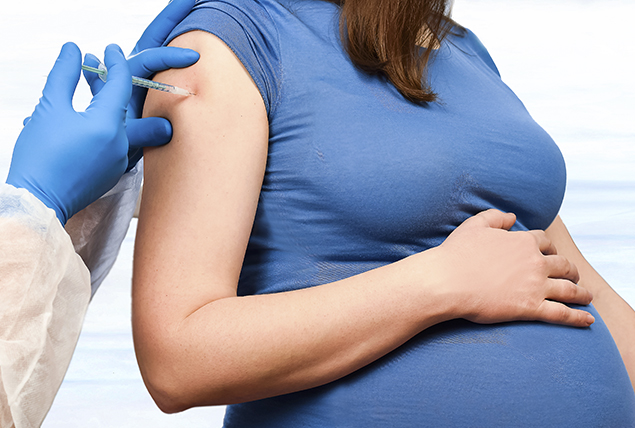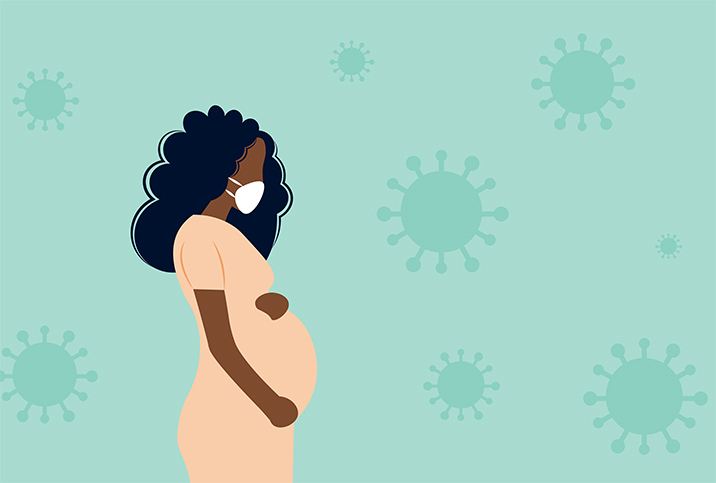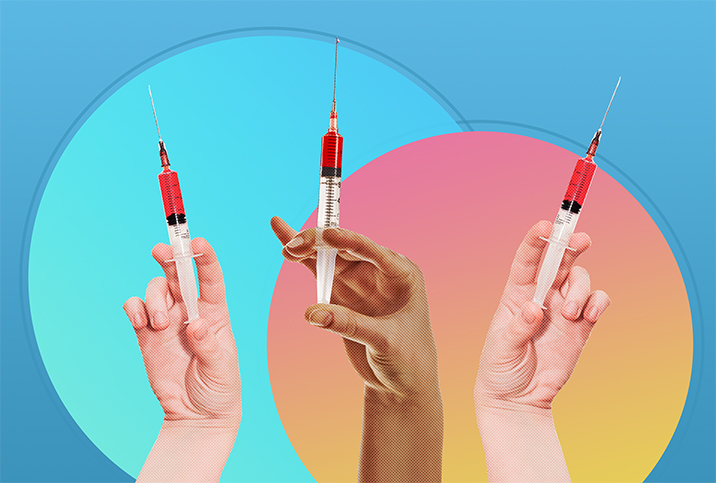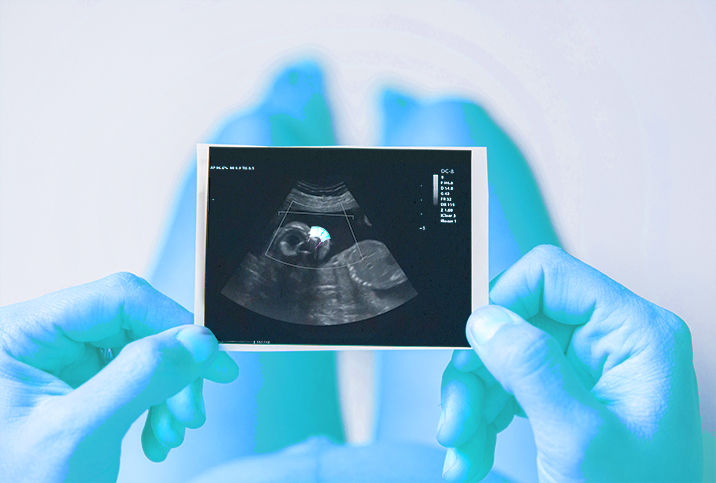What Vaccines Do Pregnant People Need?

Key Points
- Like prenatal vitamins, vaccines are an important part of prenatal care.
- Vaccines can protect pregnant people and their babies against serious, potentially life-threatening conditions.
- Certain vaccines are recommended for all pregnant people, while others may be necessary depending on specific circumstances.
When you're pregnant or breastfeeding, antibodies pass to your baby to safeguard them against infections. The immune system produces specific types of these protective proteins to fend off diseases. Some naturally occur once you've contracted and recovered from an illness.
Vaccines for pregnant people are the most reliable source of certain antibodies and help keep you from getting sick in the first place. They can help protect your child from potentially serious harm.
Why are vaccines recommended for pregnant people?
Babies and birthing mothers are immunocompromised, meaning they're more vulnerable to severe illness than the general populace, said Candice Schwartzenburg, M.D., an OB-GYN with UTHealth in Houston.
Mild illnesses such as the common cold are relatively harmless, but certain diseases can be dangerous for pregnant people and their unborn children. For example, the flu or COVID-19 vaccines may not provide complete protection against these illnesses but typically reduce the disease burden and severity, said Tiffany Pham, D.O., an OB-GYN in Houston and a medical advisor for the women's health app Flo.
Unvaccinated expectant mothers are more likely to have worse symptoms that may require hospitalization.
When a pregnant person contracts a severe illness, the baby is at risk because the infection can cross the placenta, potentially causing congenital abnormalities or developmental issues, Pham said.
Certain illnesses, such as the flu, may increase the risk of miscarriage, a 2021 report indicated.
Prenatal care improves outcomes for mothers and babies. Here's how to stay up to date with your recommended vaccine schedule.
What vaccines should you get during pregnancy?
Some of these vaccination recommendations depend on whether you're up to date with your vaccines and the time of year you're pregnant. The Centers for Disease Control and Prevention (CDC) and American College of Obstetricians and Gynecologists (ACOG) recommend the following four vaccines for most pregnant people, Pham said:
- Tdap. Recommended in all pregnancies
- Flu. Recommended in all pregnancies
- COVID-19. Recommended if you're not up to date with your boosters or haven't been vaccinated before pregnancy
- RSV. Recommended in the second half of the third trimester from September through January
These vaccinations are administered during pregnancy to help birthing people develop antibodies that they can pass on to their unborn baby through the placenta, Schwartzenburg said. Breastfeeding women can give their children antibodies through their milk.
Other immunizations, such as the measles, mumps and rubella (MMR) vaccines, are given before conception to prevent infections from a dangerous disease during pregnancy, Pham said.
Some people who are pregnant or planning to become pregnant may need additional vaccines depending on their specific circumstances and medical history, Pham said. Follow local guidelines and discuss your needs with your medical provider.
COVID-19 vaccine
One of the most well-documented facts about COVID-19 is it is life-threatening and can lead to chronic disease or long COVID. Pregnant people are particularly vulnerable to this.
Expectant parents who are up to date with their COVID vaccines are less likely to be infected, Pham said. They have lower rates of complications such as stillbirths, preterm deliveries or low birthweight babies.
Even if a vaccinated pregnant person contracts COVID, they're less likely to experience severe symptoms that may require hospitalization or a ventilator, Schwartzenburg said. COVID-19 vaccination during pregnancy offers protection to babies.
People six months old and older can receive the vaccine, according to the CDC, but babies under 6 months must rely on their mothers' antibodies.
Some research suggests babies exposed to the live COVID virus in utero are at an increased risk of complications such as motor delays, a weakened immune system and an abnormal growth pattern early in life that may lead to problems such as obesity and cardiovascular disease, according to Mayo Clinic.
The vaccine, which contains an unactivated version of the virus, is considered safe and effective in all trimesters, Schwartzenburg said.
Recommended
- COVID-19 Vaccination During Pregnancy Helps Babies, Too: Infants born to vaccinated mothers are less likely to catch the virus, a study finds.
- A Primer on Monkeypox and Pregnancy: With virus cases on the rise, it's important expectant moms know how to keep themselves safe.
- The Importance of Prenatal Infection Awareness: Protecting yourself protects your baby.
Flu vaccine
If you're pregnant during flu season, you should get your inactivated influenza vaccine as soon as possible. As with COVID-19, pregnant people are more likely to experience severe flu symptoms due to their immunocompromised state, said Grace Banner, M.D., an OB-GYN at Rush Medical College in Chicago.
Babies born to unvaccinated moms are more likely to contract the flu and become seriously ill. Getting a flu shot can provide your baby with antibodies to protect them until they're old enough to be immunized.
Medical professionals recommend the flu vaccine to protect moms from hospitalization, respiratory distress, preterm labor and preterm birth, according to Schwartzenburg. These are all known complications of the flu during pregnancy. The vaccine is recommended because babies with the flu can develop pneumonia and dehydration; they are even at risk of death.
"The good news is that the flu vaccine is safe for pregnant women and their fetuses at any gestational age and can prevent these serious outcomes," she added. "Flu season is here, so get yours today."
Respiratory syncytial virus (RSV)
RSV is one of the most common viral infections among infants and newborns, affecting 97 percent of children before they are 2 years old, Pham said.
"While it may start as a mild illness, it can progress to a more severe infection causing difficulty breathing, the need for hospitalization and oxygen support, or even pneumonia," she said. "The younger the infant, the higher the likelihood for severe illness."
The CDC recently released a new recommendation that pregnant people receive their RSV vaccine between 32 and 36 weeks of gestation.
When given during this period, it can provide antibodies that protect the baby from severe disease for about six months and reduce the likelihood of RSV-related hospitalization by about 57 percent, according to Cleveland Clinic.
If you don't want to get the vaccination, your baby can receive a medication called nirsevimab, Banner said. This drug, a monoclonal antibody given as a single-dose injection, can protect infants under 8 months old for about six months. However, in October 2023, the CDC issued a warning that nirsevimab is in short supply.
Tdap vaccine
The Tdap (tetanus, diphtheria and pertussis) vaccine is recommended for pregnant people between 27 and 36 weeks of gestation to reduce the risk of these illnesses in newborns, Pham said.
Infants can't receive their immunization until they are between 2 months and 6 months old.
"Tdap is an extremely important vaccine that prevents your baby from getting whooping cough (also known as pertussis), which can cause violent coughing fits, making it difficult for newborns to breathe," Schwartzenburg said.
Despite its nickname, pertussis doesn't always cause coughing, which can make it difficult to tell if a baby is sick. Some children don't cough at all but stop breathing and turn blue.
Pertussis can be life-threatening, Pham said. The younger a baby is at the time of infection, the higher the risk of hospitalization or death.
About 7 in 10 deaths from pertussis occur in babies younger than 2 months old, according to the CDC.
What are other vaccines some expectant mothers may need?
Generally, people should receive hepatitis A and B vaccines before becoming pregnant. However, there are some circumstances in which it's appropriate to get them during pregnancy, Pham said.
Hepatitis is a preventable and potentially life-threatening liver infection that can lead to liver damage, failure or cancer. The hep B vaccine is safe during pregnancy and recommended for all people ages 19 to 59 who haven't been inoculated, including pregnant people, Schwartzenburg said.
Hepatitis A causes liver inflammation that can range from mild to severe, according to the World Health Organization (WHO). The hep A vaccine is safe to receive while pregnant. It is recommended for people with conditions such as liver disease or HIV that make them more vulnerable to acquiring the infection or developing severe repercussions, according to Schwartzenburg.
Hepatitis vaccines that protect you and your baby from infections are recommended if you're an injection drug user, have multiple sexual partners or household contacts with hepatitis, or live in or are traveling to certain countries, Pham said.
Check the CDC website for the latest information regarding particular travel destinations and vaccine recommendations.
Some people may need pneumococcal vaccines to protect against severe pneumonia during or after pregnancy, Banner said. It's best to receive this vaccination before becoming pregnant if possible, according to the WHO.
Is it safe to get a live vaccine during pregnancy?
Most vaccines don't contain a live version of a virus and are safe to receive during pregnancy, per the CDC. However, the few that are live-attenuated are unsafe for pregnant people, Banner and Schwartzenburg said.
The most common live-attenuated vaccines are MMR and varicella (chicken pox).
The recommendation to avoid these vaccines during pregnancy is based on a theoretical risk that live viral particles could cross the placenta and infect the fetus. Such an infection could contribute to congenital abnormalities, Banner said. However, there's no evidence of these risks in practice.
"There are cases where people accidentally receive the live vaccine before they know they are pregnant. In some of these cases, such as the MMR or varicella vaccine, it has not been associated with infection of the baby causing congenital disabilities or complications," Pham said.
Some exceptional circumstances exist in which the risk of vaccination may outweigh the benefits.
"In some patient populations who are at risk for serious diseases such as smallpox, polio, dengue or yellow fever, where live virus vaccines are available, the data shows that vaccination for these conditions does not increase the risk of congenital disabilities, miscarriages or stillbirth—except for smallpox, which can increase the risk of congenital disabilities or miscarriages," Pham said.
Talk to your healthcare provider about the potential risks versus benefits of receiving a live vaccine.
The bottom line
Like prenatal vitamins and a balanced diet, vaccines can help support your health and that of your baby during and after pregnancy.
"It's always important to weigh the risks and benefits of interventions in pregnancy," Banner said. "The benefits of recommended vaccines are well established and
the risks are quite small for most people."
If you have questions about what vaccines you need, when to get them, and their potential risks and benefits, talk to your healthcare provider.


















